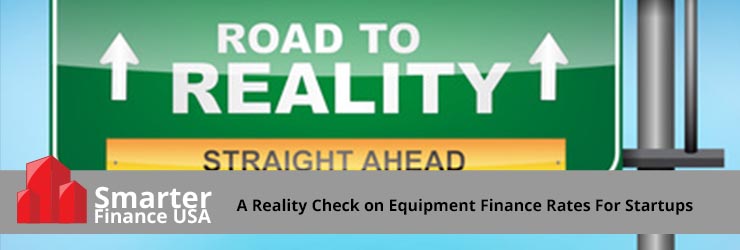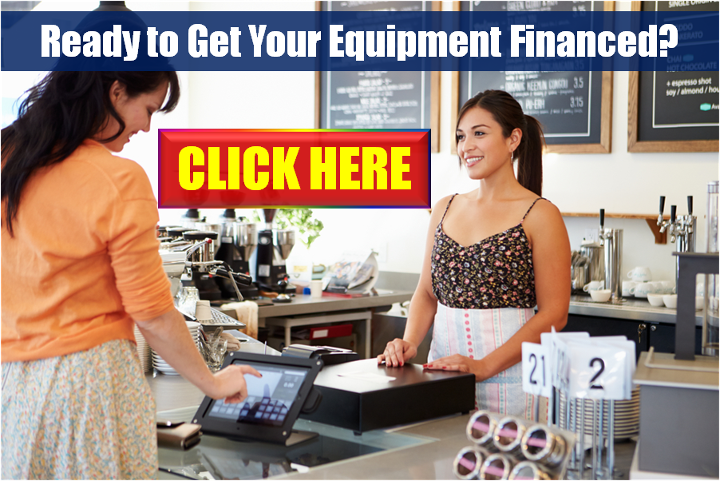4 min read
A Reality Check on Equipment Finance Rates For Startups
![]() Rob Misheloff
Aug 9, 2014 3:09:49 PM
Rob Misheloff
Aug 9, 2014 3:09:49 PM


Want to know a secret?
Startup financing rates are high.
They're even higher if you have bad credit.
How high?
Let's go over the two scenarios (names, industries and circumstances have been changed slightly), and look at finance offers and how they came about.
Note: To find out what your rates might be, click here.
Financing a Used Bobcat for a New Business With Bad Credit
Last week we spoke with "Pete" - a contractor with six months in business who has been renting a Bobcat for $2,000 a month.
Pete has poor credit since he failed to pay some of his bills on time recently, and he missed a payroll a few months back when work was slow.
Let's go over Pete's scenario, using the 5 C's of Credit:
Character:
Pete may be a nice guy, but from a credit standpoint, he is of poor character. Someone of good business character will find a way to make payroll no matter what - whether that means pawning every vehicle, putting the couch on EBay, selling pints of blood, or whatever. Someone who doesn't pay their employees on time is not likely to pay a lender on time.
Capacity:
What is the track record of the Pete's company? So far, he has not been able to pay his bills on time - showing a lack of capacity to pay his debts.
Capital:
Has Pete put any money into the business? The only piece of equipment he uses is a rental - the business is totally uncapitalized.
Conditions:
Lenders look at two things -
- What are current economic conditions?
- Is the business particularly sensitive to economic conditions.
While economic conditions are currently good for contractors, when the economy turns down, many contractors tend to be wiped out.
Collateral:
Here is the only reason Pete would be approved - he has 3 paid-off vehicles that he owns.
Of the 5 C's of credit, Pete scores one and a half out of five. Would you lend money to Pete?
It just so happens, since Pete has collateral, he can get approved. However, the lender has to price in the fact that Pete is very likely to default on the loan, and at the very least, is almost certain not to make all his payments on time.
Pete was offered financing on a $20,000 Bobcat for $960 a month over 5 years, or $1,175 for 3.
High rate financing?
TRUE THAT.
But keep two things in mind:
- Pete was paying $2,000 to rent his equipment, by taking on "high rate" financing he cuts his monthly outflow by about $1,000 a month, and would now be building equity in his equipment.
- The only reason anyone will lend to Pete is that there is stuff that can be repossessed when he stops paying for his equipment.
What would do if you were Pete? Yep, I'd take the high rate financing too.
Financing for a "Seedy" Business Startup With Good Credit
There are some industries where businesses may be solid, but might be the kind of business that nobody actually wants in their neighborhood. These sorts of businesses are on most lender's "restricted list", not because anyone is passing judgment on anyone else, but for two reasons:
- Lowlifes tend to be attracted to these industries because of the very nature of these businesses.
- Laws are often passed, whether on a local, state, or national level that can severely and suddenly affect cash flow and put many out of business.
We had a call from a startup owner, "Bill" (risky already just for the fact that the company is a startup) in one of these restricted industries, but the owner had stellar credit and collateral. Rates offered were consistent with lending to a startup that nobody really wants to do business with. Bill needed about $75,000 but thought he deserved a lower rate. Let's go over Bills "C's"
Character:
Being in a yucky industry doesn't necessarily mean you have bad character, but it is harder to obtain financing.
Credit:
Bill had great credit.
Capacity:
Bill's company is cash flow positive.
Conditions:
Bill's industry is growing fast, and most "sin" industries do ok during downturns.
Collateral:
Bill had plenty.
Would you lend to Bill?
Of course you would, although there's risk due to the industry factor we mentioned, and financing is never cheap for a startup.
Bill was offered 3-year financing at $3,500 a month on $75,000, (so, about $1,400 of each payment was finance charges) and he chose to pay cash for his equipment.
Find out What Your Rates Will Be
I don't blame him - if you have the cash and using it won't affect your cash flow, you shouldn't be financing unless it's cheap. If Bill didn't have the cash, he would have been stupid to pass up the financing, though.
Why would high rate financing be OK? The fact was, Bill expected to make $16,000 a month by using this equipment, so after payments he would be looking at $12,500 net.
Why is Startup Equipment Financing So Expensive?
Forget the first guy we talked about. No matter what, Pete's financing was going to cost a lot. However, in Bill's case, over 3 years total payments come out to around $125,000 on a $75,000 loan. That's a tough pill for many to swallow, but if you could really finance startups for cheaper, wouldn't you do it and corner the market?
A startup (or any company) that needs equipment has 3 options:
- Equity financing
- Debt Financing
- Don't buy the equipment
What is Equity Financing?
Equity financing is when someone provides your company money, in exchange for ownership in your company. If you have plans to make your company successful, there is no more expensive financing than equity. Imagine your name is Andy Bechtolshein, which means you were the first investor to have put $100,000 into Google. That $100,000 turned into about $1.7 billion - which is some pretty expensive capital for the founders.
What is Debt Financing for a Startup?
Debt financing is just a fancy name for a loan.
Since many startups fail, as someone giving out loans to new companies, you have to charge a "risk premium" - especially since there won't be any chances to make $1.7 billion on the successes to make up for all the failures.
If Capital is Too Expensive, Should I Just do Without Equipment?
Sometimes it makes sense just to not buy the equipment. We work with a lot of startups, and one of the first questions we ask any business that looks for financing is, "how will having this equipment impact your business?"
Generally, the only reason a business buys equipment is to grow revenue or to cut costs. We like to work out the numbers with our clients - asking the following:
- What will the payments be on the equipment?
- What cash flow or savings will the equipment generate?
- Is the economic utility of having the equipment substantially greater than the cost?
- Are there cheaper alternatives for financing that you can qualify for?
"Economic utility" is geek speak - what I mean by that is, "based on the numbers you work out, after factoring in the costs of the equipment, should you buy the equipment?"
What we find is, smart business owners ask these questions - and it doesn't make any difference at all what the rates are after we answer these questions.

